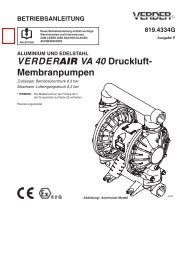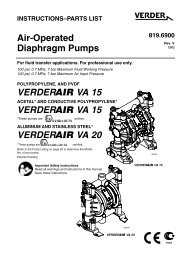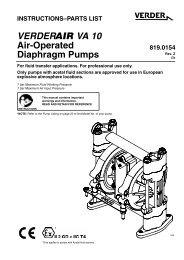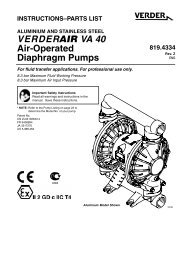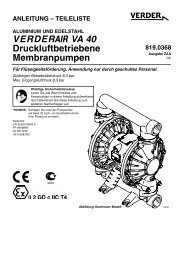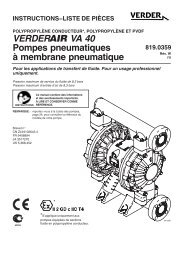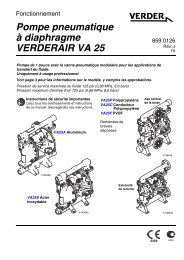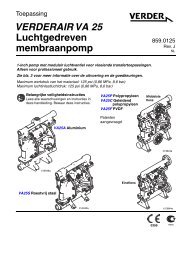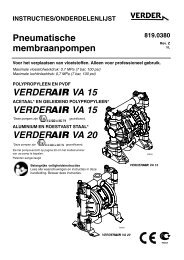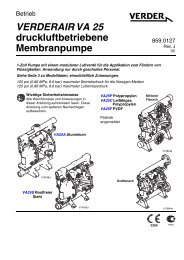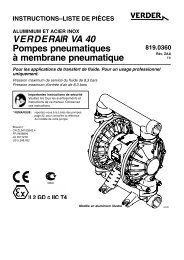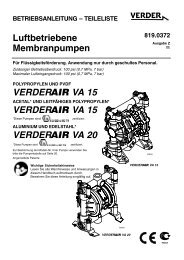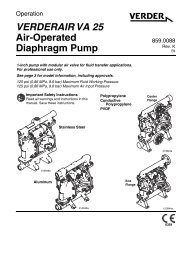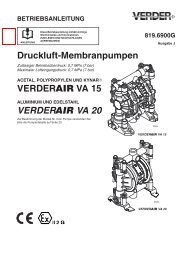Air-Operated Diaphragm Pump
Repair or Replace Air Valve - Double Diaphragm Pump
Repair or Replace Air Valve - Double Diaphragm Pump
- No tags were found...
You also want an ePaper? Increase the reach of your titles
YUMPU automatically turns print PDFs into web optimized ePapers that Google loves.
WARNING<br />
PRESSURIZED EQUIPMENT HAZARD<br />
Fluid from the gun/dispense valve, leaks, or ruptured components can splash in the eyes or on skin and<br />
cause serious injury.<br />
• Follow Pressure Relief Procedure in this manual, when you stop spraying and before cleaning,<br />
checking, or servicing equipment.<br />
• Tighten all fluid connections before operating the equipment.<br />
• Check hoses, tubes, and couplings daily. Replace worn or damaged parts immediately.<br />
THERMAL EXPANSION HAZARD<br />
Fluids subjected to heat in confined spaces, including hoses, can create a rapid rise in pressure due to<br />
the thermal expansion. Over-pressurization can result in equipment rupture and serious injury.<br />
• Open a valve to relieve the fluid expansion during heating.<br />
• Replace hoses proactively at regular intervals based on your operating conditions.<br />
PRESSURIZED ALUMINUM PARTS HAZARD<br />
Use of fluids that are incompatible with aluminum in pressurized equipment can cause serious chemical<br />
reaction and equipment rupture. Failure to follow this warning can result in death, serious injury, or property<br />
damage.<br />
• Do not use 1,1,1-trichloroethane, methylene chloride, other halogenated hydrocarbon solvents or<br />
fluids containing such solvents.<br />
• Many other fluids may contain chemicals that can react with aluminum. Contact your material<br />
supplier for compatibility.<br />
PLASTIC PARTS CLEANING SOLVENT HAZARD<br />
Use only compatible water-based solvents to clean plastic structural or pressure-containing parts. Many<br />
solvents can degrade plastic parts and cause them to fail, which could cause serious injury or property<br />
damage. See Technical Data in this and all other equipment instruction manuals. Read fluid and solvent<br />
manufacturer’s warnings.<br />
TOXIC FLUID OR FUMES HAZARD<br />
Toxic fluids or fumes can cause serious injury or death if splashed in the eyes or on skin, inhaled, or<br />
swallowed.<br />
• Read MSDS’s to know the specific hazards of the fluids you are using.<br />
• Route exhaust away from work area. If diaphragm ruptures, fluid may be exhausted with air.<br />
• Store hazardous fluid in approved containers, and dispose of it according to applicable guidelines.<br />
• Always wear impervious gloves when spraying or cleaning equipment.<br />
BURN HAZARD<br />
Equipment surfaces and fluid that’s heated can become very hot during operation. To avoid severe<br />
burns:<br />
• Do not touch hot fluid or equipment.<br />
• Wait until equipment/fluid has cooled completely.<br />
PERSONAL PROTECTIVE EQUIPMENT<br />
You must wear appropriate protective equipment when operating, servicing, or when in the operating<br />
area of the equipment to help protect you from serious injury, including eye injury, inhalation of toxic<br />
fumes, burns, and hearing loss. This equipment includes but is not limited to:<br />
• Clothing and respirator as recommended by the fluid and solvent manufacturer<br />
• Protective eyewear, gloves, and hearing protection.<br />
859.0089 5



